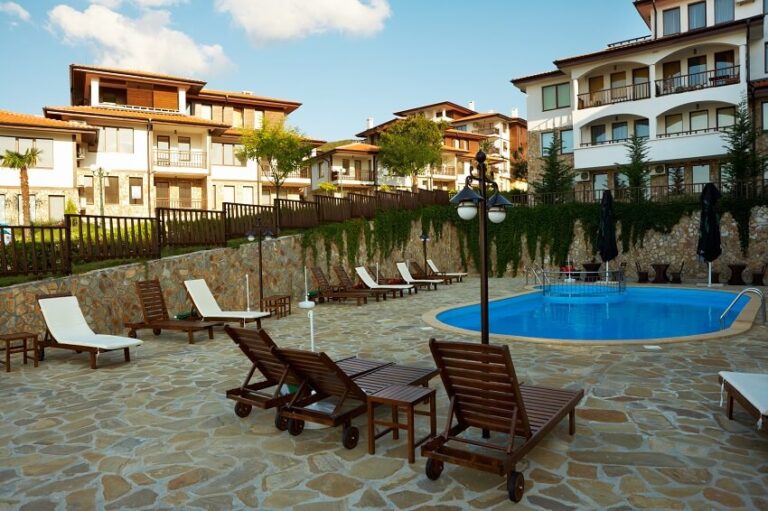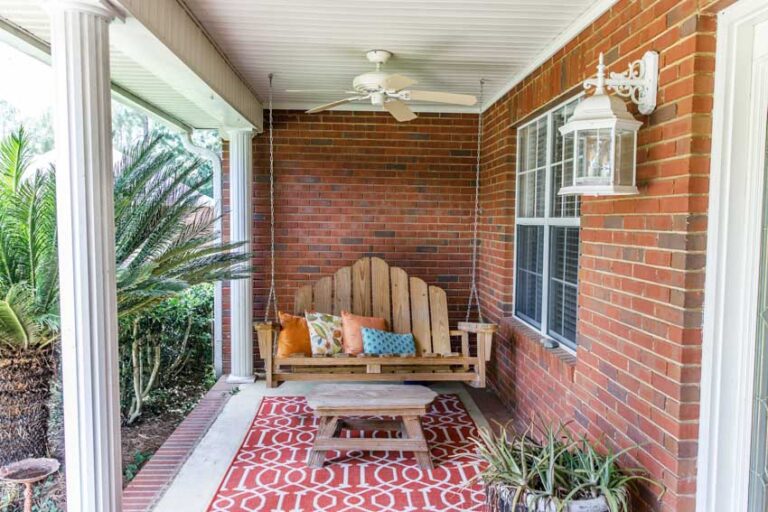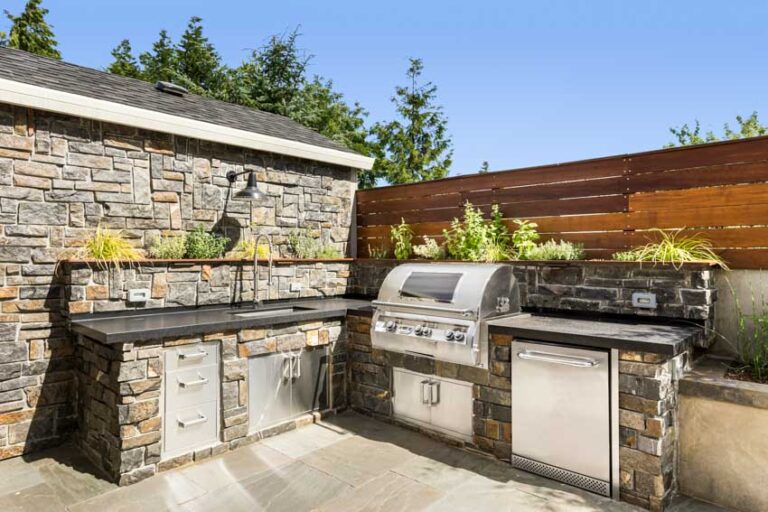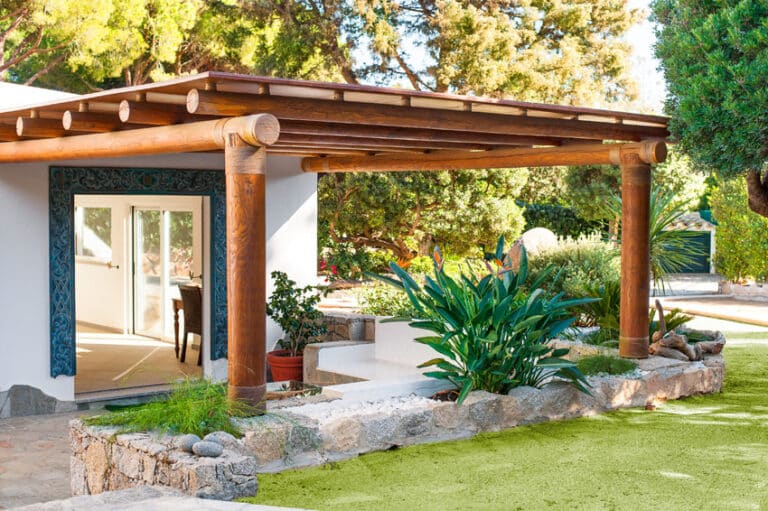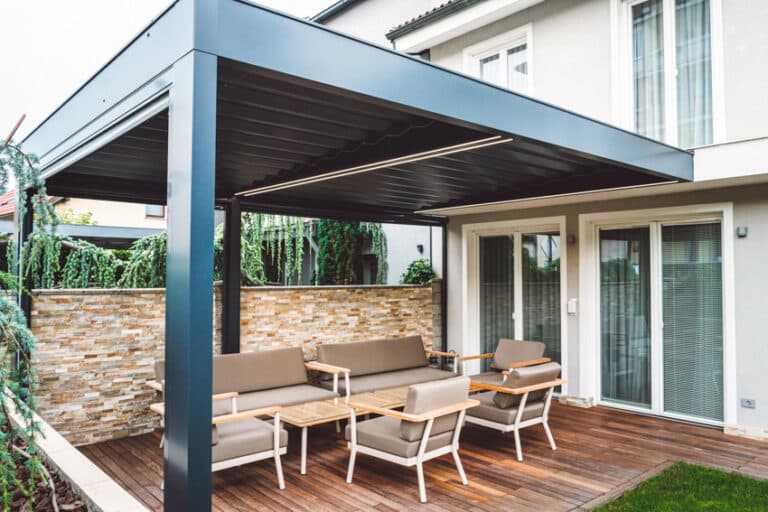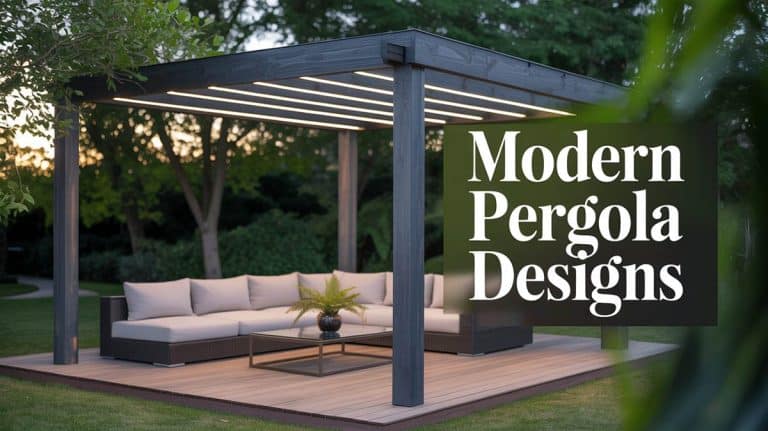Best Rocks For Fire Pit (11 Options To Use)
A fire pit in your backyard can instantly increase the real estate value of your home as well as increase your yard appeal overall. If you’re considering getting a fire pit and you’re wondering where to start, we’ll get right down to the basics.
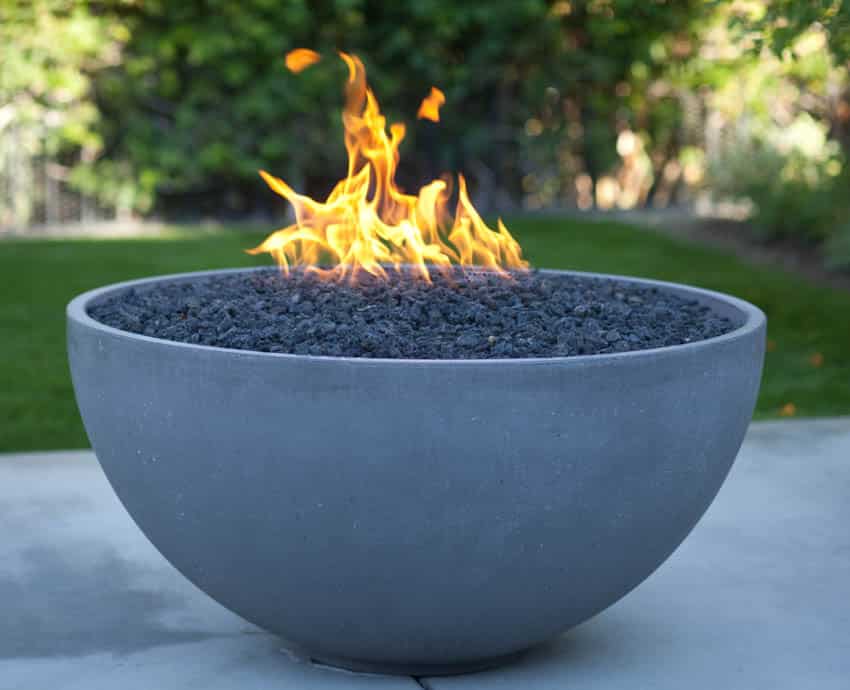
Before starting you have to first consider what the requirements are in your specific city’s building ordinance requirement for the construction of fire pits in the backyard. Some city codes require screens to make the fire safer and ban open fires altogether.

Upload a photo and get instant before-and-after room designs.
No design experience needed — join 2.39 million+ happy users.
👉 Try the AI design tool now
Some require the fire pit to be a certain number of feet away from trees and other dense foliage. Once your research is done and you’re all good to go, it’s time to look into what goes at the bottom of the pit to get you started.
A proper bottom is required for the pit to properly light up to begin with. It’s one of the most important elements of lighting a fire. And here are the best rocks for you to use when starting one:
Lava Rocks
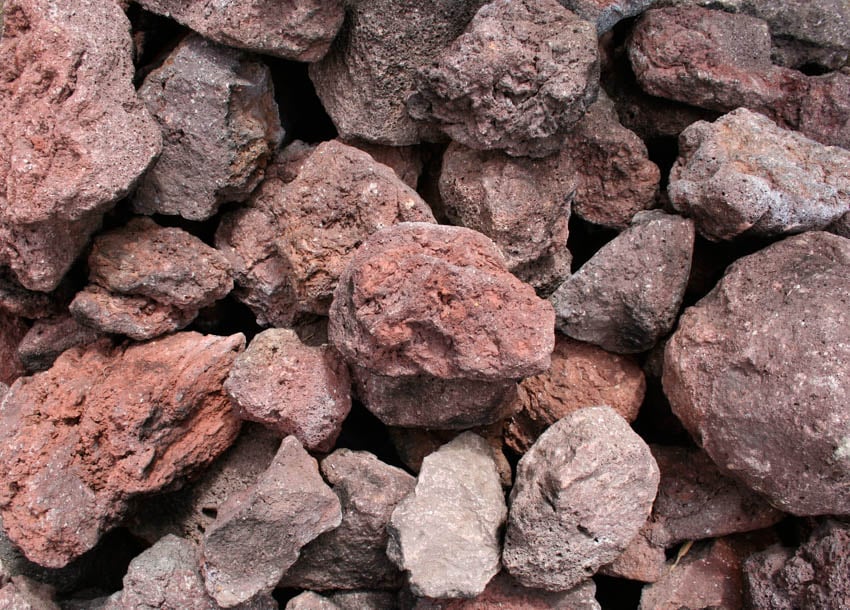
Lava rocks are attractive to look at and they’re excellent conductors of heat. This makes them one of the most perfect rocks to use at the bottom of a fire pit.
Lava rocks are typically created from magma and come from obsidian origins and unlike ordinary rocks, they are less likely to crack and explode. If they would withstand the high temperatures of lava, they can definitely withstand the temperatures they’re exposed to in a fire pit.
Laval rocks are multifunctional. They’re great as decoration, obviously, because they look stunning with colored and rugged features.
Their porosity is great for plants and soil because they’re excellent at retaining moisture. They come in a wide range of sizes so you can play on variety for added aesthetics.
They can give your fire pit that “full” look without trying too hard and of course, they’re 100% safe and eco-friendly.
Lava rocks also come cheap so you can get lots of them in bulk especially if you’re planning on building a relatively large pit. They’re fairly easy to install; you just need to empty them out in the fire pit and kind of level the layer with a shovel.
And they have excellent heat distribution, which makes it so much easier to keep your flames going for longer periods.
Lava Glass
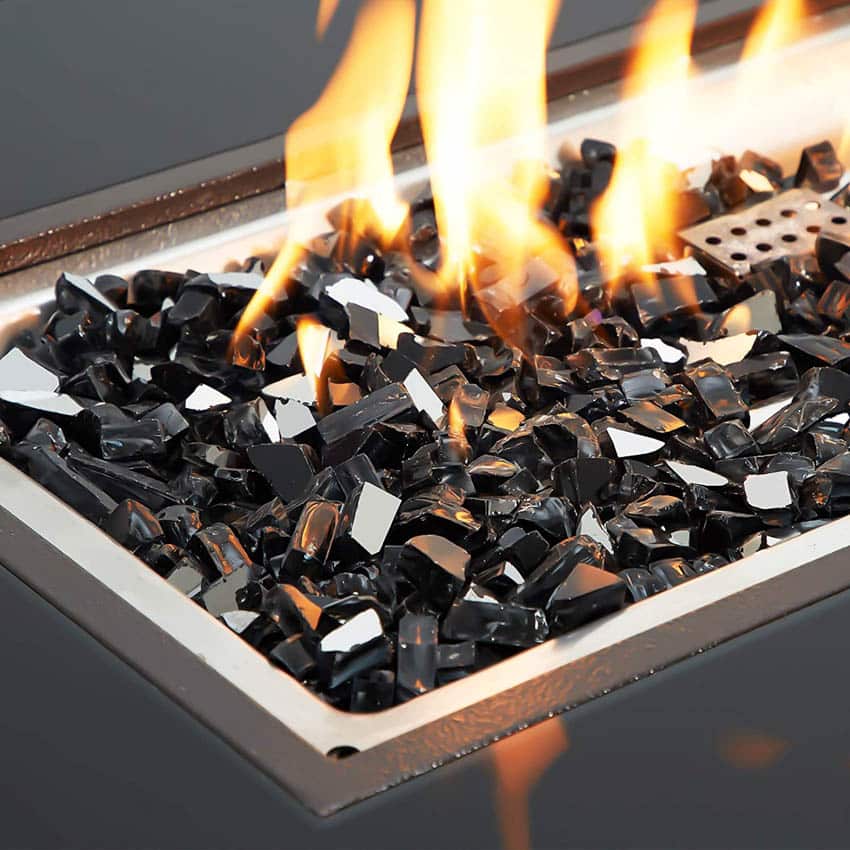
Amazon – See this lava glass at Amazon [sponsored link]
Lava glass is a glassy type of rock that’s formed from magma or lava. Its chemical composition is very close to that of granite, with a few added elements of quartz as well as alkali feldspar.
Because of its high viscosity, which inhibits its crystallization when exposed to extremely high temperatures, the substance turns into glass instead of crystal; giving you the end result of lava glass.
If you would like to stay away from the bland aesthetics of the usual rocks and logs, lava glass can present you with a rather attractive and eye-catching option. It can turn your fire pit into a showpiece right off the bat.
Because glass has lots of reflectivity, it tends to absorb heat better and faster, and hence, it can definitely give off more heat compared to lava rocks. They also come in smaller and more regularly shaped pieces which means that they get to distribute heat more evenly when placed inside.
There’s also something that looks magical when you see lava glass in action because it reflects a lot of light and it sparkles as well. If you prefer something that’s pretty on the eyes, can hold its color and its glass properties well without melting, then you’re in for a treat when you see lava glass in action.
Understandably, this is tempered and at times engineered at a certain level so it definitely comes at a much higher price point compared to lava rocks, which typically come in quite cheaply.
However, if you feel that its wow factor in its aesthetics would be worth it, then lava glass is a pretty good material to have at the bottom of your backyard fire pit.
Fire Pit Glass
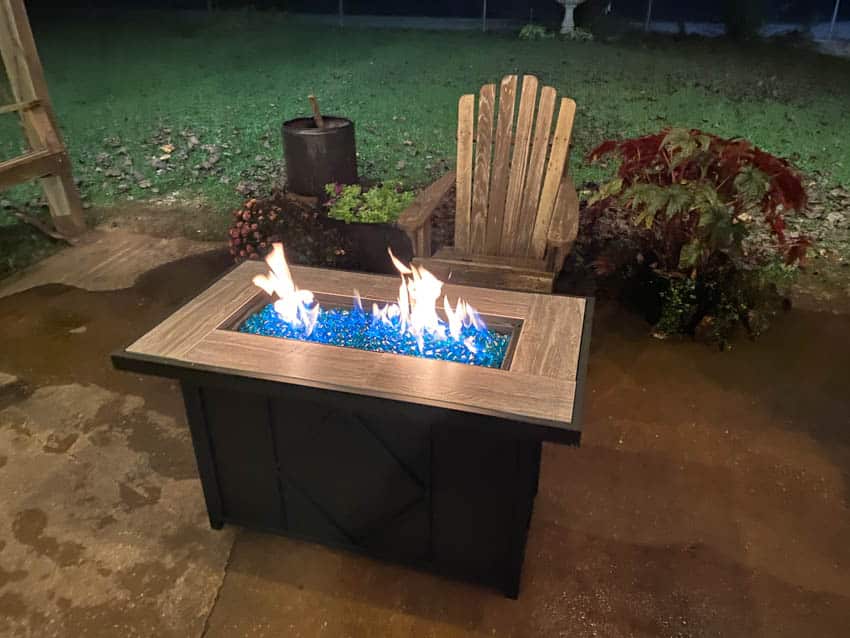
Glass is another great material to have at the bottom of your backyard fire pit. Unlike lava rocks and lava glass though, it isn’t naturally occurring.
Fire pit glass is something that’s man-made or synthetic. They come in a lot of variations from classic, to premium, to recycled, to fire beads, and even zircon. Here’s how they vary from each other:
Classic Fire Glass: This has a crushed glass appearance, comes in a wide variety of colors, and in ½” and ¼” sizes per piece.
Premium Fire Glass: This glass type comes with a polished surface, almost mirrored, and can be very colorful. It creates a prism of colors and can look quite vibrant and reflective even without being lit on fire.
Recycled Fire Glass: This glass type came from eco-friendly efforts as they’re repurposed or recycled. Basically, old material is re-fired to manufacture it like new again. it comes in a lot of different colors and sizes as well ranging from ½” to ¾” per piece.
Zircon Fire Glass: This type of glass is aesthetically appealing because it comes in a diamond shape and has a considerable amount of luster.
It has the element of luxury to it so if you’re looking for something that looks really good whether or not it’s lit up, zircon fire glass tops the cake.
Other Materials To Use
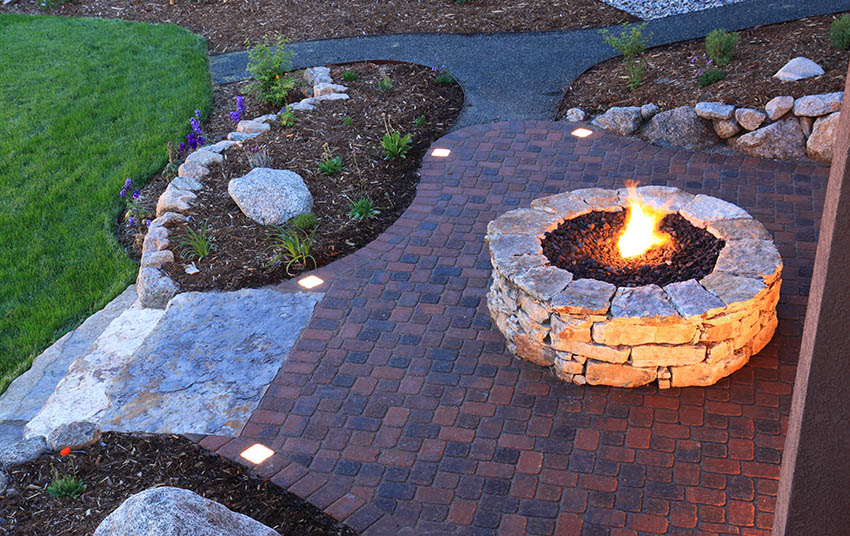
Technically speaking, soil alone is a good enough material to have at the bottom of a fire pit. However, if you would like to put in a few enhancements that are easy to procure and come cheaply; there are a handful of materials that you can consider.
We’ve itemized them for you down below:
Sand
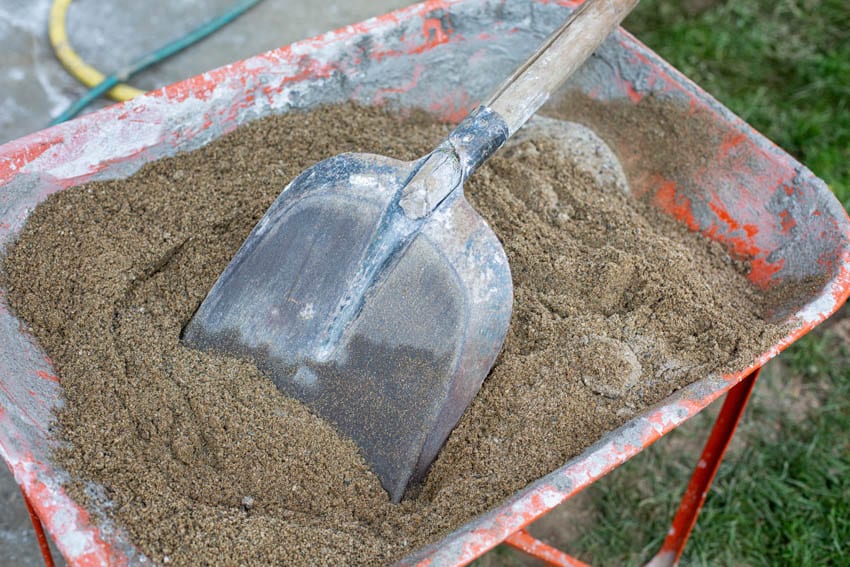
Sand is ubiquitous and it can be seen at the bases of fire pits all over the country. It’s cheap, can be relatively found anywhere, and it provides a great heat shield for your flame.
Sand is great because it absorbs heat coming from the fire and evenly distributes it out to the rest of the pit it’s layered on. A downside to sand though is that it has the tendency to mix in with the ash once your kindling, wood, or coals burn out so it can turn to slush.
It requires periodic maintenance of getting it scooped out and replaced with a fresh layer of sand.
Dirt
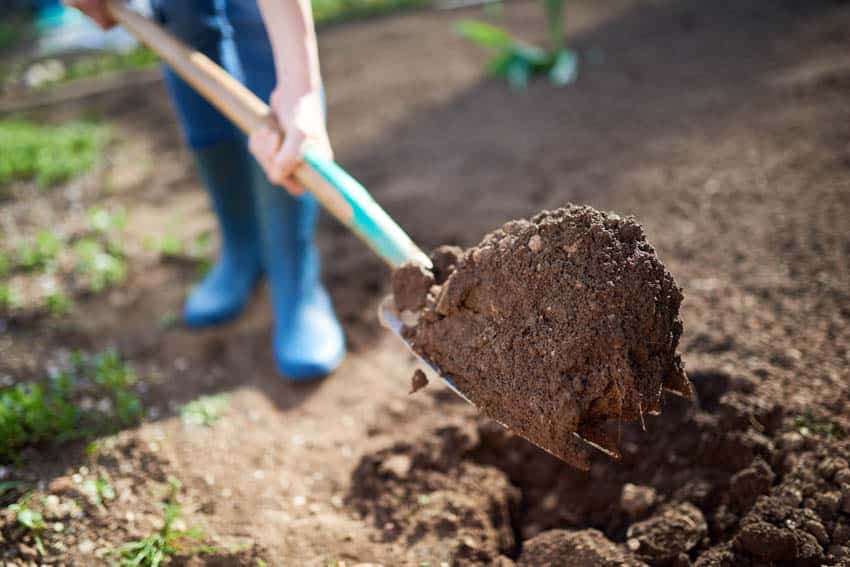
Dirt is naturally heat resistant, is quite easy to use, and is technically free. It’s a great economical option to have at the bottom of any type of outdoor fire pit.
Similar to sand, its main downside is that it can mix in with the ashes, turning it into mud and it can get pretty messy over time.
Aside from putting in an extra amount of time and effort in its maintenance of getting it scooped out and replaced with a fresh layer of dirt, it’s still a pretty great material to line the bottom of your fire pit with.
Fire-Rated Brick
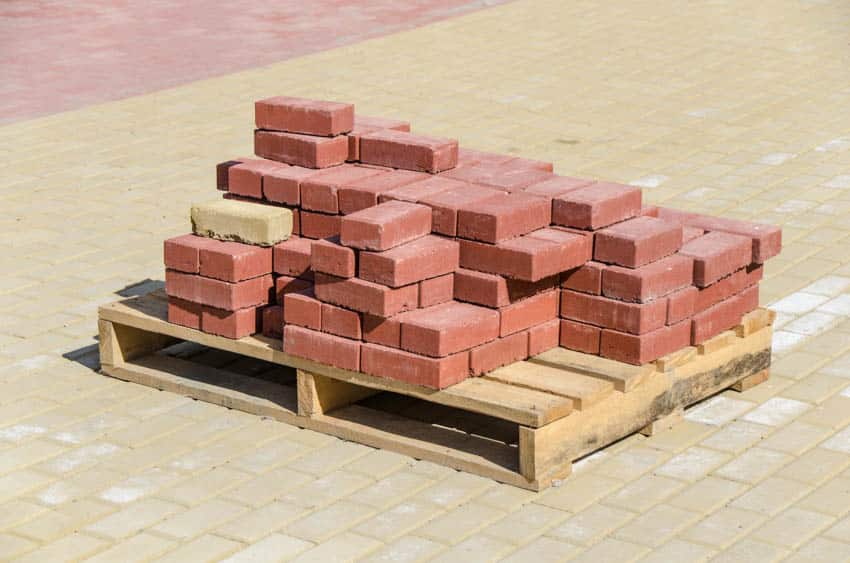
Fire-rated bricks are refractory blocks of ceramic materials. They’re commonly used to line furnaces, kilns, outdoor fireplaces, and of course, fire pits.
A fire-rated brick’s composition is built to withstand high temperatures but at the same time, it is also a low or slow conductor of heat. It’s great to be used as a material lining at the bottom of your basin because it keeps the heat in without being damaged or cracked or worse, exploding.
Poured Concrete
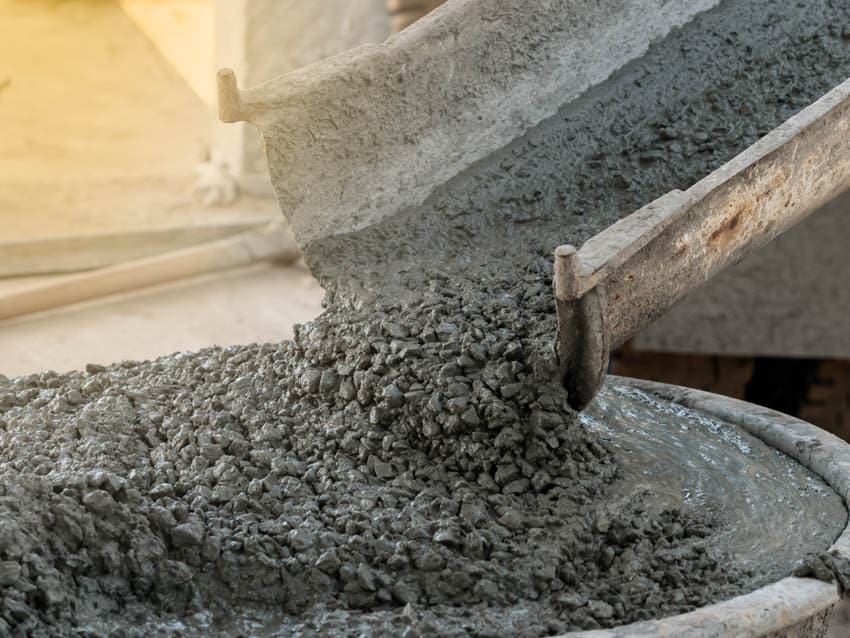
Poured concrete, in theory, makes for a good base for your fire pit but you have to consider the fact that regular concrete can crack or get damaged when exposed to large amounts of heat.
This is why a special type of concrete called Quikrete can be useful. Once you’re purchased the right type of concrete, you can even line the base of your basin with your own hands.
You can consider it as a DIY project so you can do it at an affordable cost.
Stainless Steel Bowl
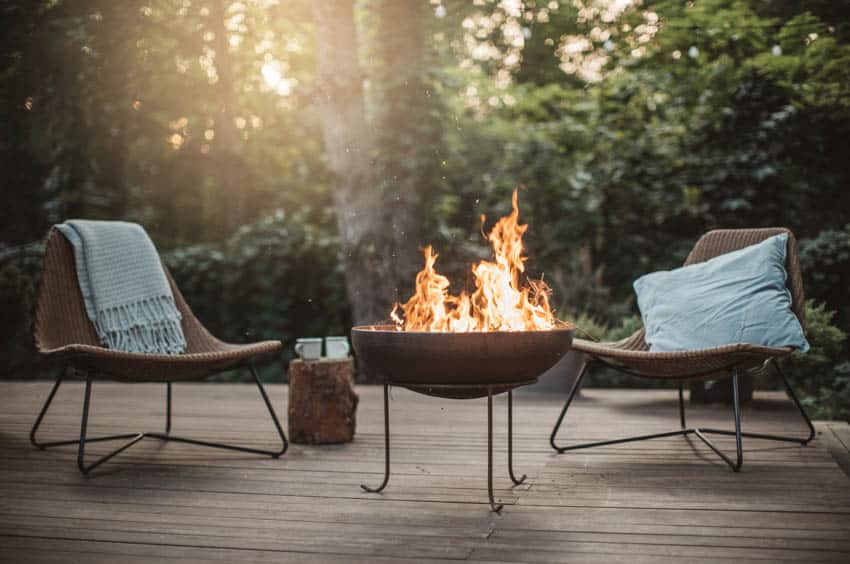
A stainless steel bowl has a naturally high melting point which means that it can withstand the high temperatures it will be exposed to when used as a base for your fire pit.
It’s durable and is quite resistant to corrosion so even if it rains outside and it gets wet at times, it won’t get damaged or corroded.
They come in a lot of different finishes whether you would like to go for the polished look of a brushed mill finish or the more rustic appeal of rusted steel, there’s bound to be something for your preference.
Best Rocks For Gas Fire Pit
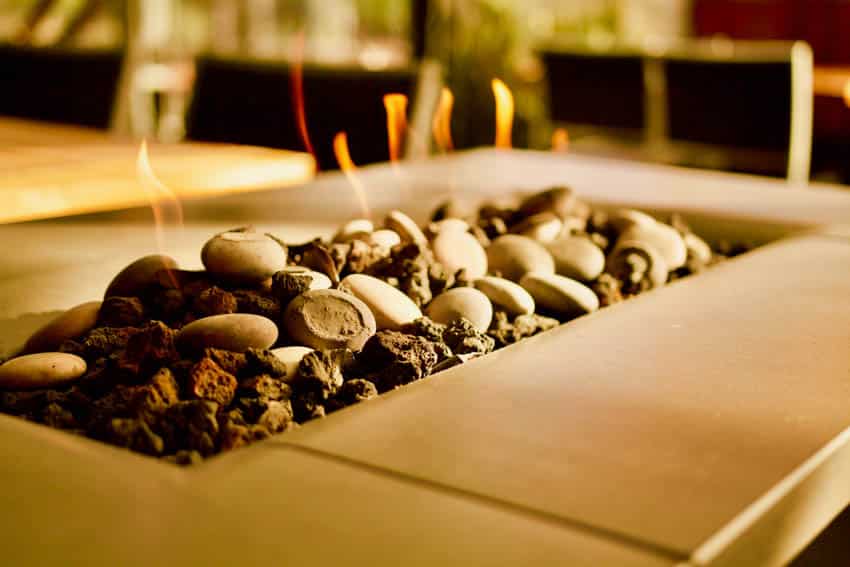
The most recommended material to use for a gas fire pit is fire glass. Here are some of the best-rated glass rocks to use.
Celestial Reflective Tempered High Luster
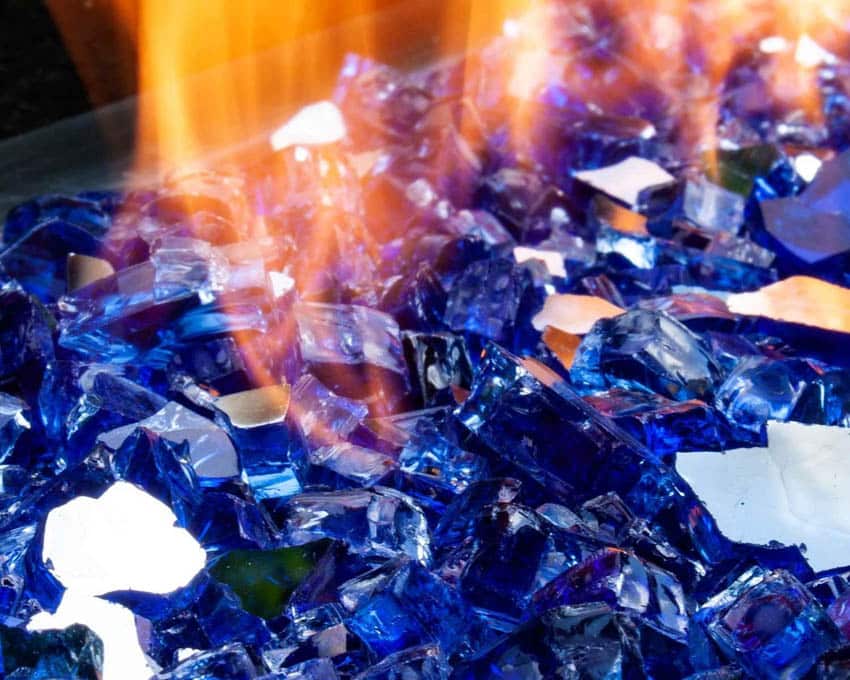
Amazon – See this reflective high luster glass at Amazon [sponsored link]
• They come in several color options
• Made out of tempered glass material
• Comes in ½’ pieces
• Has reflective mirror backing for added aesthetics
• Comes with reusable glass packaging
AZ Patio Firepit Recycled Glass
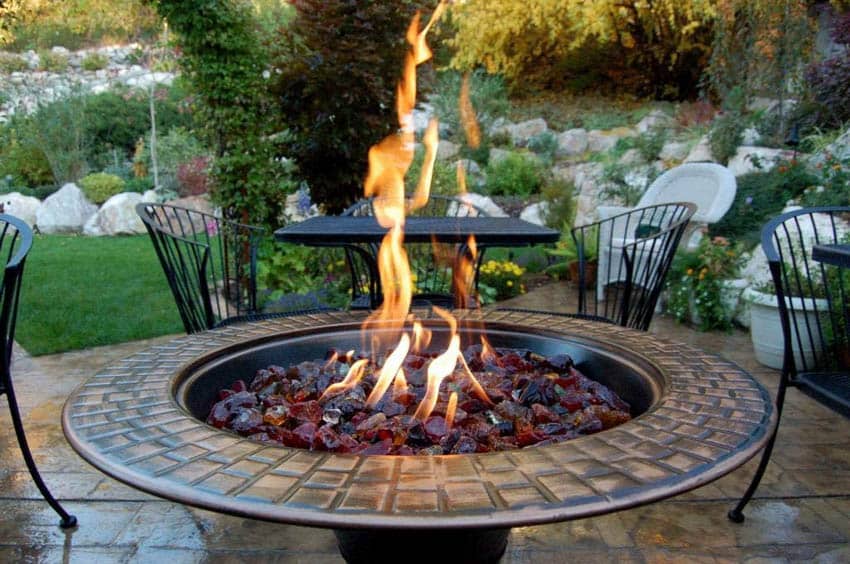
• Made from eco-friendly recycled glass
• Comes in 1/3” pieces
• Has a metallic or mirror-coated backing
• Is available in 12 vibrant colors
Golden Flame Caribbean Reflective
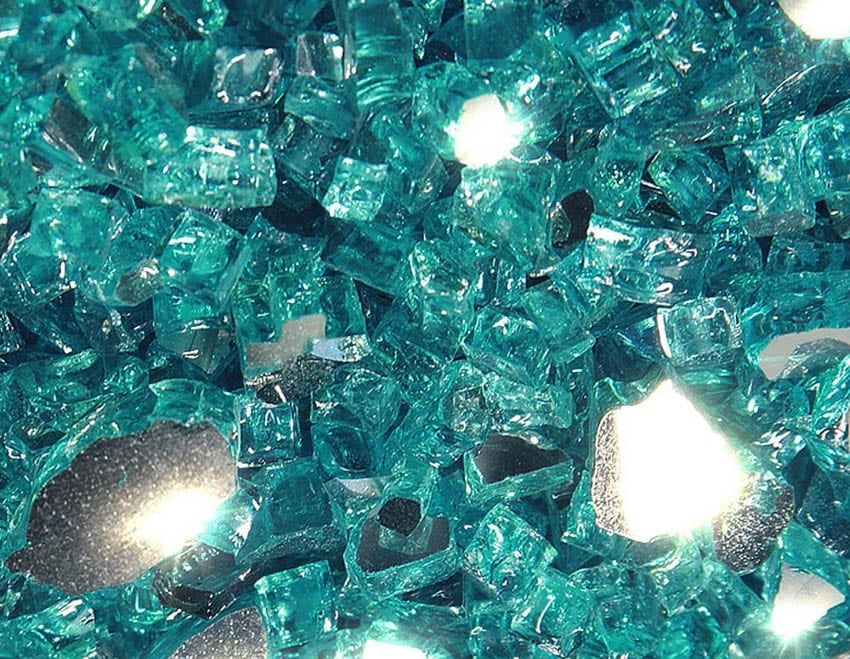
Amazon – See this golden flame Caribbean reflective glass at Amazon [sponsored link]
• Made out of premium tempered glass
• Comes in ½” pieces
• Has jewel-like qualities and colors
• Is available in several colors
• Has a gently tumbled glass quality
How Long Do Lava Rocks Last
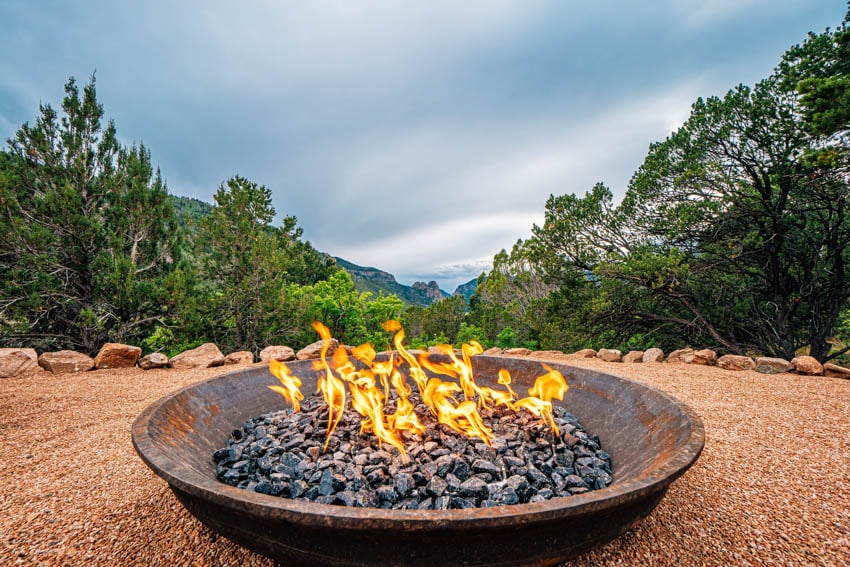
Lava rocks traditionally have a lifespan of around 2 years. After that estimated period of time, grease buildup is considerable enough to affect the smell and taste of food being grilled on it.
It will also start to show signs of wear and tear and unavoidable deterioration; which is a good sign to start replacing it with a fresh batch.
How Much Lava Rock To Use?
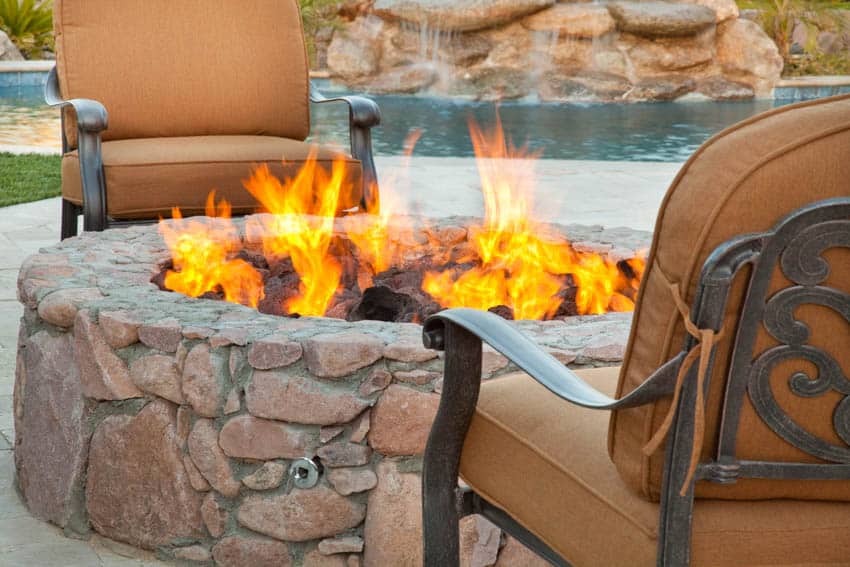
It really depends on the size of the basin you have as one of your backyard essentials. But as a good rule of thumb, you need to have a layer that’s around 4 to 5 inches thick.
This enables you to build your fire efficiently without scorching the base that the lava rocks are layered on.
How To Clean Out Lava Rocks
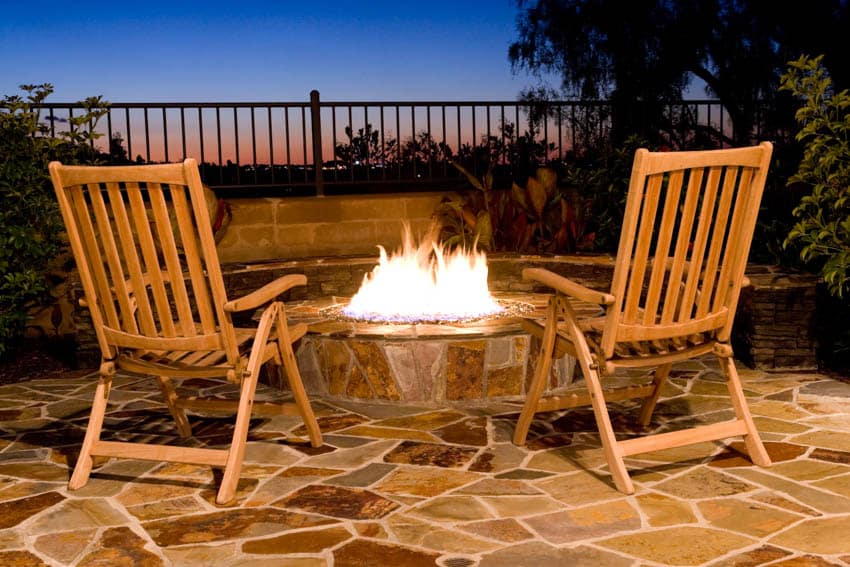
Cleaning out a fire pit with lava rocks in it is pretty simple and basic.
You first just need to scoop out the lava rocks and wash them separately, so you can get rid of all of the grease and gunk that has accumulated on the pieces.
Then you need to clear out all of the contents of your basin with a shovel. It’s best to get into the nooks and crannies and brush them all out so that you can get rid of any residual ashes.
Hose them down as well for a more thorough clean-up. Make sure that both the basin and the lava rocks are completely dry before you layer them on top again.
What Kind Of Rocks Explode In Fire?
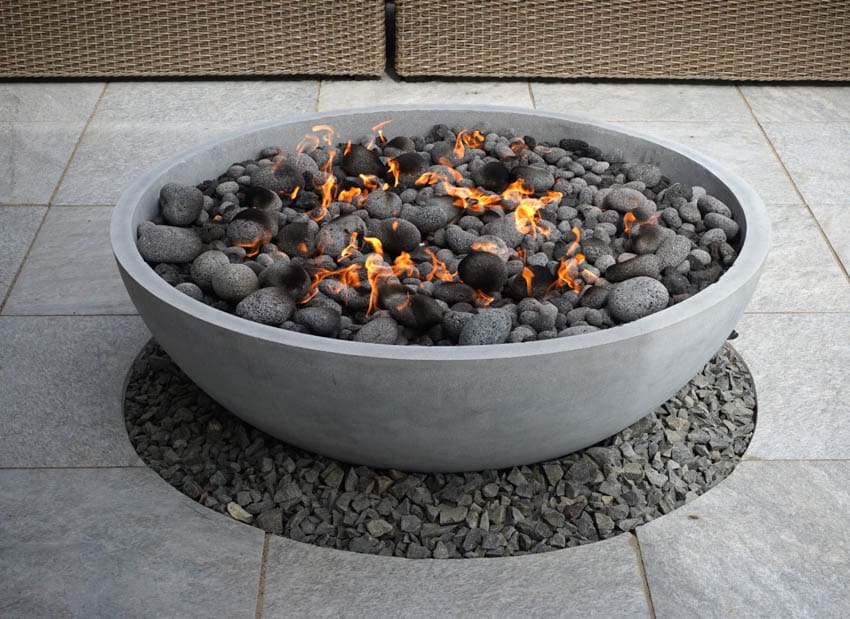
Exploding rocks can be a bit of a safety hazard and in order for you to avoid them from happening in a fire pit, stay away from the kinds of rocks that are air or water-permeable.
The reason behind this is that when air or water enters the rocks, the heat it’s exposed to can cause them to expand and hence, explode.
This is why denser rocks are much preferred for use. Also, make it a point to make sure that the rocks you do layer on are dry to further minimize the risks of them exploding.
Can I Use Gravel?
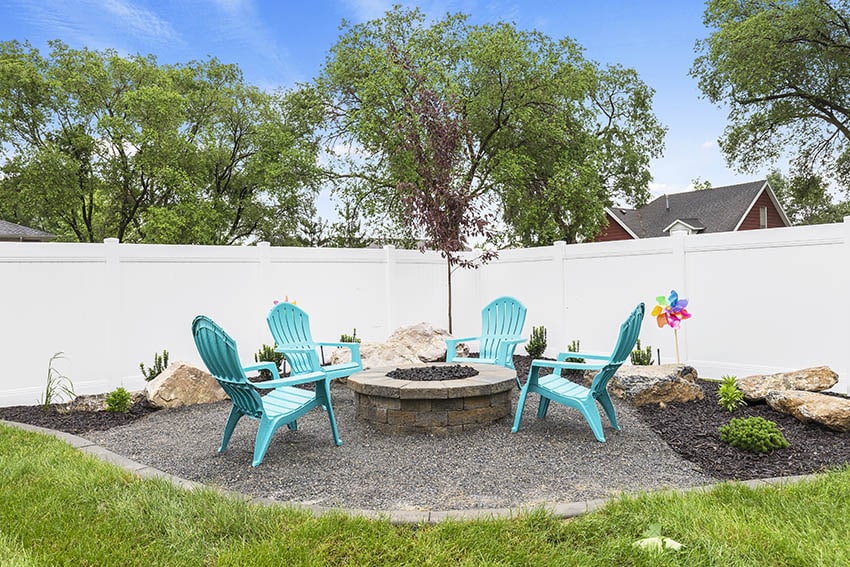
Most gravel is not a recommended material to have in a fire pit because it’s highly likely to expand, crack, and explode once exposed to high temperatures. Even smaller stones like pea gravel can pop and crack when heated and should not be used. Those that are porous like river rocks and sandstone can be dangerous and should always be avoided.
There are a lot of other fills to use so it would be best to just avoid filling with gravel altogether. Very hard rocks like marble, slate, and granite, could be suitable. Check with the manufacturer warning if purchasing before use to be safe.
Are Pavers Safe To Use?
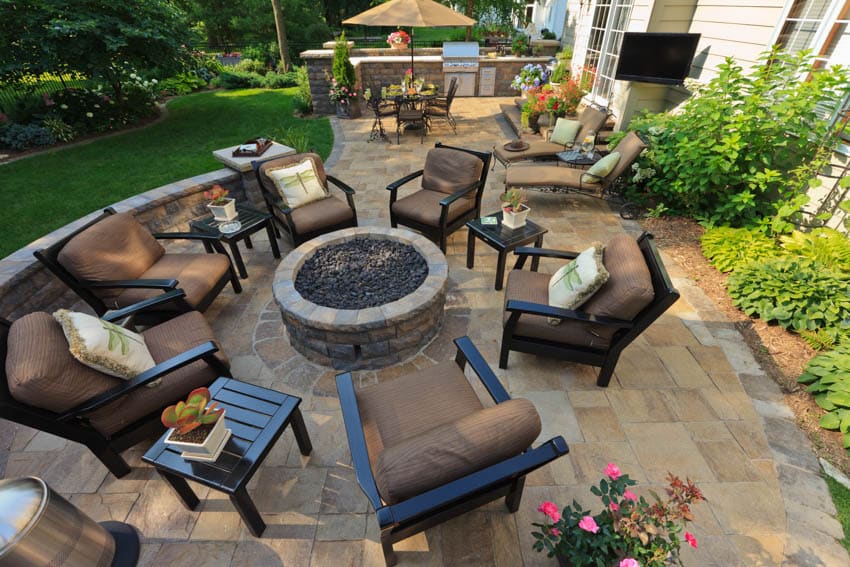
Pavers should be safe to use, but as an extra precaution, it would be best to choose the kiln-fired ones because they’re less likely to break and crack under the pressure and temperatures of extreme heat once you light it up.
How Deep Do Pits Need To Be?
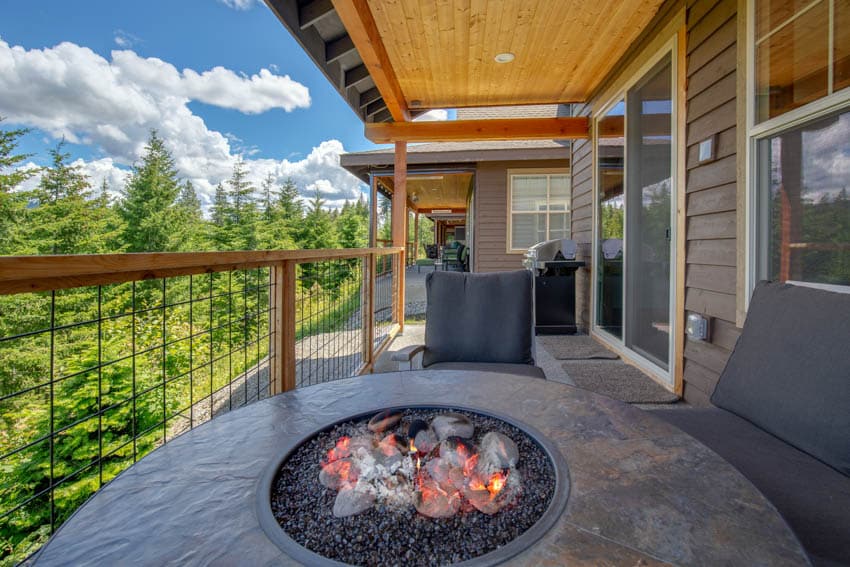
The recommended depth for fire pits is a range of 6 to 12 inches.
Technically speaking, it all depends on how deep you would like it to be but sticking to these standard measurements will ensure that you have enough depth to layer a base material at the bottom.
If you want to go a little deeper, you can. You just need to proceed with caution as you still want to make sure that you will be able to see and enjoy the fire once it’s lit up. See more related content at our article about granite fire pit on this page.

